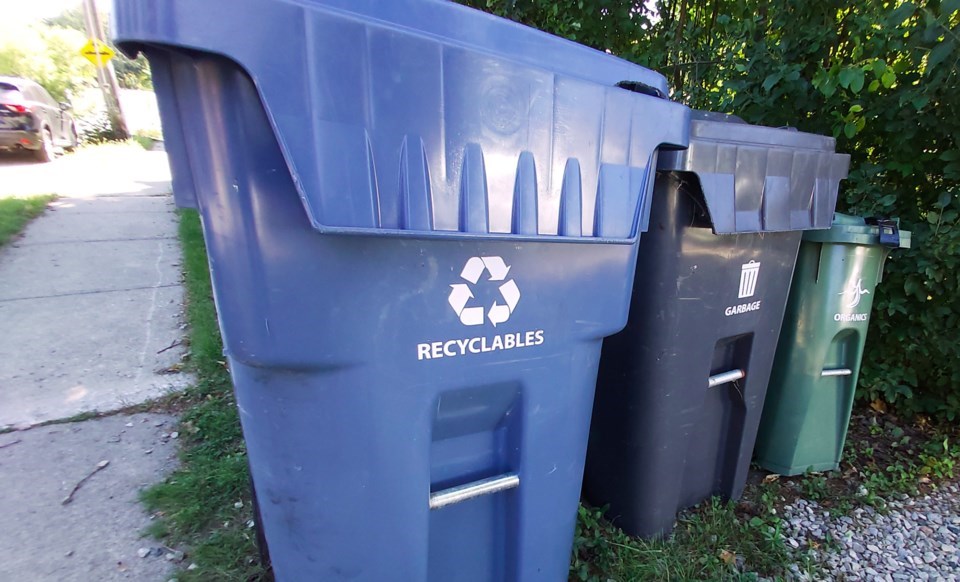Don’t be surprised if you see a gold star on a neighbourhood waste cart. It’s the mark of a job well done.
In June and July, city staff selected different neighbourhoods to participate in a trial run of the Gold Star program, to proactively recognize people for properly sorting their waste.
The Gold Star program was developed through the Our Food Future initiative of the Smart Cities office as part of the city’s regular curbside inspection program. As staff inspected waste carts, they provided customized messages to help residents improve their sorting practices, reduce unnecessary waste going to landfill and reduce the cost of waste management.
“The Gold Star program aims to engage residents in proper waste sorting. It reiterates that proper sorting, or diversion, is valuable and important. Waste diversion is a critical component of sustainability, as properly sorting our waste allows for resource recovery through recycling (blue cart) and composting (green cart),” said Samantha Halloran, environmental program specialist with the City of Guelph.
“This preserves landfill capacity for the future, recovers nutrients and valuable materials, and significantly reduces greenhouse gas emissions. When valuable materials can be kept out of landfill, they can be used for other purposes that have economic value. For example, the compost produced from green cart material in Guelph is used on local farms to improve soil and support crop growth."
Our Food Future aims to make the food system in the city more sustainable.
“One important way for people to participate is to make sure food waste gets in the green cart. The Gold Star program was our way of recognizing and rewarding our community members for doing a great job of sorting their waste,” said Ashlee Cooper, manager of food equity and community resiliency, in the city’s Smart Cities Office.
“We thought it would be a good way to make waste sorting fun and help the City achieve its waste diversion goals.”
The Gold Star program recognizes and rewards residents who are properly sorting their waste, indicating it is valuable, important and encourages continued good sorting.
Additionally, Halloran said, because the gold star sticker is visible on the waste carts to other residents, research shows it inspires curiosity and motivation in residents who want to improve their sorting habits or learn more about proper sorting.
More than 500 gold stars were distributed, and 16 prizes were awarded during the two-month trial.
Prizes included family memberships to Guelph museums, Guelph On Your Way transit cards loaded with 10 rides, recreation passes for 10 adult visits, and Downtown Dollars gift certificates.
Halloran said the city is continuing to pilot elements of this initiative in fall 2023 and will evaluate the Gold Star program as part of the curbside waste inspection program for continuation in 2024.
“We have received positive feedback from residents across the city. Residents have noted that they appreciate their efforts in waste sorting being noticed by the City. Several residents who won prizes in the draw were pleased that they won a prize that allowed them to engage with other sustainable behaviours such as public transit,” Halloran said.
“A number of the participants joined us as we celebrated waste reduction in August at a community meal at Exhibition Park, catered by Community FEWD.”
City officials have a goal to help reduce the amount of waste landfilled per household to 250 kilograms per year by 2030.
Halloran said as of 2020, rates were approximately 280 kilograms per household per year.
"In 2022, through good sorting, home composting and behaviour changes, we were able to keep 55 per cent of household curbside waste out of landfill. To continue in this direction, the city is implementing additional strategies, pilots and programming to promote reuse, repurposing and to reduce waste generation,” Halloran said.
“We appreciate the efforts that residents make to properly sort their waste, as it helps to keep our staff safe, reduces the impact on the environment, and minimizes costs.”
Halloran said proper waste sorting is a tangible way that residents can individually have a positive impact on the environment.
If there are any questions about waste sorting, or any other city initiatives related to waste, residents can visit guelph.ca/waste or download the waste sorting app.
“It is important to think about ways we can reduce or avoid generating waste in the first place. Some strategies to reduce waste include avoiding unnecessary purchases, choosing minimal packaging where possible, and donating, repairing or repurposing items when no longer needed,” Halloran said.



